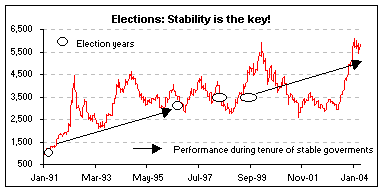In the top-down approach to investing in stock markets, politics tops the list and its importance cannot be understated.
It is not surprising that stock markets are nervous with the elections already underway and crashed by a 213 points as exit polls hinted at a hung Parliament.
Let's take a look at the effects that politics have on the stock markets.
For our study, we have taken the last four general elections held in the years 1991, 1996, 1998 and 1999, i.e. the post-liberalisation phase.
From the table below, we notice that for two of the years i.e. 1991 and 1999, the stocks markets rallied. Of course, liberalisation in early 1990s and tech mania in early 1999 were also reasons for robust stock markets.
The performance in the other two years has been rather dismal. Interestingly 1991 and 1999 were the two years in which the populace voted in a government (one absolute and the other a coalition), which had a clear majority to rule the country for the next five years.
At the same time, in the other two years, political instability was a reality.
| January | December | Change (%) | GDP Growth (%) | |
| 1991 | 982 | 1,909 | 94.4 | 5.6 |
| 1996 | 3,049 | 3,085 | 1.2 | 7.3 |
| 1998 | 3,720 | 2,963 | -20.3 | 4.8 |
| 1999 | 3,060 | 5,006 | 63.6 | 6.6 |
The reader may be tempted to conclude that during years when the populace voted for stable governments at the Centre, the stock markets rallied. A stable government is not the beginning and the end of it.
Despite strong economic growth in the last few years of the Congress tenure between 1995-96, the party was voted out of power in 1996. For the next two years, the country was plagued by political uncertainty and the economic condition was also mixed.
While the real GDP growth in FY97 was over 8%, one of the highest ever in the history of the country, it fell to 4.3% in the succeeding year.

It can, to a certain extent, be observed that political uncertainty has a bigger impact on the stock markets than the performance of the economy. This is because, for any economy to grow and prosper, it needs to implement policies and reform measures that may bring fruit only over the long term.
So, while the stock market participants may factor in the benefits of a stable government very early, it will take some time to reflect on broader economic parameters like per capita income, interest rates, inflation and so on.
In the Indian scenario, years of rule under the Congress government led to a state where the country relied largely on PSUs (public sector undertakings) for employment generation.
The License Raj also stunted the incentive to invest as far as the private sector is concerned.
In 1991, when the economy was liberalised, it was more so out of compulsion than out of choice. In the Indian context, while the economic liberalisation was gradual, results started to show in the latter years of the Congress rule of 1991-96.
The stock markets rewarded this performance in the period between 1991 and 1996 by way of a huge 210% rise in the Sensex levels. This directly corroborates the argument that a stable government at the Centre is of significance for the stock markets.
Without taking political sides, we observe similar performance in the stock market in the period since 1999 and now. Even if one were to discount the 2000 stock market rally, which may have been an anomaly, on a point-to-point basis (1999-04), the Sensex gained 94 per cent.
As is evident, during period of a stable government rule (early 1990s and in the last five years), more number of steps seems to have been taken as far as economic policies are concerned.
Yes, there may have been odd hiccups. But overall, the direction of government policies has been clear when there is stability. Be it, simplifying tax structures (direct and indirect), foreign direct investment policies, strengthening the financial system, government spending and reforms in public infrastructure and utilities.
All these have shaped the way India has emerged over the last fourteen years. While we are not getting into the argument of who did the best, generally, the decision-making has been faster when there is independency in framing of policy (the classic case is the functioning of the Reserve Bank of India) and stability at the Centre.
All these reforms carried out over the period of the last 14 years have managed to make India Inc. more competitive in the global scenario.
The investing community, recognizing this improvement and potential of Indian companies, has shown its confidence in the stock market. Having said that, we still have a long way to go.
So, what is the lesson? Investors at this stage need to realise that a stable political situation at the Centre is always beneficial for them. Since economics touches the life of each one of us in one way or the other, it becomes important that the electorate makes an informed decision as to who should be voted to power.
The election manifestos of various parties play an important role here. While the promises may not always be met, one needs to exercise higher weightage to the overall direction of a party and the people who are likely to make decisions on 'your' behalf.
Equitymaster.com is one of India's premier finance portals. The web site offers a user-friendly portfolio tracker, a weekly buy/sell recommendation service and research reports on India's top companies.





